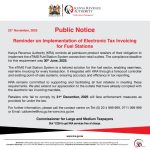Published on 01/07/2025
The Uganda Revenue Authority (URA), through its Tax Investigations Department, has intensified efforts to root out fraudulent claims for customs exemptions, a growing form of tax abuse threatening Uganda’s domestic revenue mobilization.
Recent operations have uncovered an alarming trend: taxpayers forging subcontract agreements and misrepresenting government-funded projects as donor-funded in a calculated attempt to illegally obtain duty-free import privileges. The exemptions in question are legally reserved for genuine donor-supported development projects—yet some unscrupulous individuals are exploiting this goodwill for personal gain.

“These fraudulent claims not only cheat the government of vital revenue but also undermine the integrity of exemption schemes designed to facilitate national development,” said a URA spokesperson.

How the Fraud Works
In most of the detected cases, fraudsters forge or alter subcontract agreements that falsely claim they are working on donor-funded projects. In reality, these projects are fully financed by the Government of Uganda, and the applicants have no legitimate subcontracting role.
Forged letters, fake project documentation, and misrepresented financing sources are then submitted to URA to fraudulently secure customs exemptions—particularly for high-value items such as construction materials, heavy machinery, and imported vehicles. Several of these fake claims have been traced to large infrastructure initiatives under government programs like roads, schools, and bridges.
Investigators have also unearthed cases where letters from supposed development partners were entirely fabricated, or legitimate donor references were taken out of context to mislead URA.
“These are premeditated frauds involving multiple layers of deception, designed to abuse a system that was meant to support the country’s growth,” noted a senior official from URA’s Tax Investigations team.
Legal Consequences and Enforcement
URA has swiftly responded with a wave of enforcement actions. These include the seizure of fraudulently declared goods, cancellation of wrongly granted exemptions, and criminal prosecution of offenders under Section 203 of the East African Community Customs Management Act, 2004.
Taxpayers found guilty of presenting false declarations or forged documentation risk stiff penalties, revocation of all tax privileges, and even imprisonment.
Multiple importers are currently under administrative review, and more legal proceedings are expected as investigations unfold. URA has also engaged with key government ministries and donor agencies to enhance cross-checking of project legitimacy.
Reforms and Recommendations
To seal loopholes and protect the integrity of exemption regimes, URA is strengthening its Post-Clearance Audit (PCA) processes and enhancing inter-agency collaboration. The Authority is working closely with stakeholders in Government ministries, development partner offices, and procurement authorities to verify exemption claims at source.
“Exemptions are not entitlements—they are privileges extended in good faith to facilitate real development. URA will not allow a few dishonest players to abuse this system at the expense of national revenue and public trust,” said a PCA officer.
Going forward, URA recommends the following measures to improve transparency and enforcement:
Stricter vetting of exemption applications, with thorough verification of all supporting documents.
Routine audits and risk-based investigations targeting high-risk sectors and repeat offenders.
Increased taxpayer education for contractors working on government and donor-funded projects.
Mandatory submission of authenticated subcontract agreements and verified funding letters during exemption requests.
Encouraging Whistleblowing and Ethical Conduct
URA, through its PCA and Tax Education arms, is calling on all taxpayers—especially contractors, importers, and project managers—to exercise honesty and transparency in their customs declarations. The Authority is reaffirming its commitment to supporting legitimate taxpayers while taking tough action against fraudsters.
The public is also encouraged to report suspected tax evasion via URA’s whistleblower platforms, with guaranteed confidentiality and protection for informants.
“Protecting our revenue requires a collective effort. Tax compliance is not optional—it is patriotic,” the URA Commissioner General emphasized.
A Clear Message to Fraudsters
As URA sharpens its enforcement and tightens oversight, the message is clear: fraudulent customs exemption claims will not be tolerated. With stronger audits, improved inter-agency coordination, and active public engagement, URA is reinforcing its role as a guardian of Uganda’s revenue—and sending a powerful warning to those who attempt to cheat the system.








